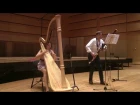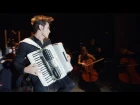Powiązane Wyszukiwania:
Wolfgang Amadeus Mozart
Johann Sebastian Bach
Franz Joseph Haydn
Georg Philipp Telemann
Georg Friedrich Händel
Antonio Molinini | pl
Antonio Lucio Vivaldi zwany Il Prete Rosso, co po włosku znaczy "Rudy Ksiądz" (ur. 4 marca 1678 w Wenecji, zm. 28 lipca 1741 w Wiedniu) włoski skrzypek i kompozytor.
Jego ojciec Giovanni Battista Vivaldi, ze względu na kolor włosów zwany Rosi - "Rudy", był golibrodą o zamiłowaniach muzycznych, przez co znalazł zatrudnienie w orkiestrze katedry św. Marka.
Antonio był pierwszym z dziewięciorga dzieci Giambattisty i Camilli Calicchio. Pobierał u ojca lekcje gry na skrzypcach, ale kształcił się na księdza i w wieku 25 lat otrzymał święcenia kapłańskie. Przyznawał się jednak do braku powołania, dlatego też przestał odprawiać msze. Plotka głosiła,...
Antonio Orozco - urodzony w Barcelonie, 23 listopada 1972 roku, dzieciństwo spędził w mieście Hospitalet de Llobregat.
W wieku lat 15 kupił swoja pierwszą gitarę i zaczął komponować.
Jego debiutancka płyta sprzedała sie w nakładzie 100,000 egzemplarzy, druga w ilości 300,000 kopii.
W 2005 roku wydał komplilację swoich największych hitów, zatytułowaną po prostu Antonio Orozco i ten właśnie krążek przyniósł mu sławę poza granicami Hiszpanii, przede wszystkim W Ameryce Południowej.
Jego najbardziej znane piosenki to "Te Esperaré" i "Déjame", dobrze zaprezentował sie również w duetach z Lucie Silvas (What You're Made Of) i Malú (Devuélveme la vida).
Jest laureatem kilku...
Antonio Aguilar was a popular Mexican singer, actor, producer and writer. He was from a small town in Zacatecas called Tayahua and was born on May 17, 1919, Died 19 June 2007. This town is close to Villanueva, Zacatecas, Mexico. The story goes that he came to California undocumented and that he slept for three days in the Plazita Olvera or Olvera Street in Los Angeles. He began his acting career during the Golden Era of Mexican Cinematography. He is credited with exposing the sport of la charrería, considered to have originated in Mexico to international audiences.
Antonio Aguilar began...
Born in Cali, Colombia, Antonio Cobo began taking guitar lessons at age six on an instrument given to him by his grandfather; it would become his companion while traveling throughout South America and while living for three years in Spain, Italy and France. Demonstrating the abilities of a natural prodigy, Cobo was sent to the Settlement Musical School at Temple University, Philadelphia; by the age of 16, he was already a music professor for classical guitar at the Music Conservatory, a position he held for five years.
Subsequently relocating to Europe, he studied with Andres Segovia and Alirio Diaz. Expanding...
António Zambujo was born in Beja, Alentejo (South of Portugal) in 1975. He grew up listening to the traditional male chant called ‘Cante Alentejano’ that became one of his strongest influences. Around the age of 8, Zambujo started studying clarinet but soon he fell in love with Fado when listening to Amália Rodrigues, Alfredo Marceneiro, Maria Teresa de Noronha and João Ferreira Rosa. And it was singing, when he was 16 years old, that he won a regional Fado contest. His professional carreer started when Mário Pacheco, the renowned Portuguese guitarist and composer, invited him to sing in his Clube...






